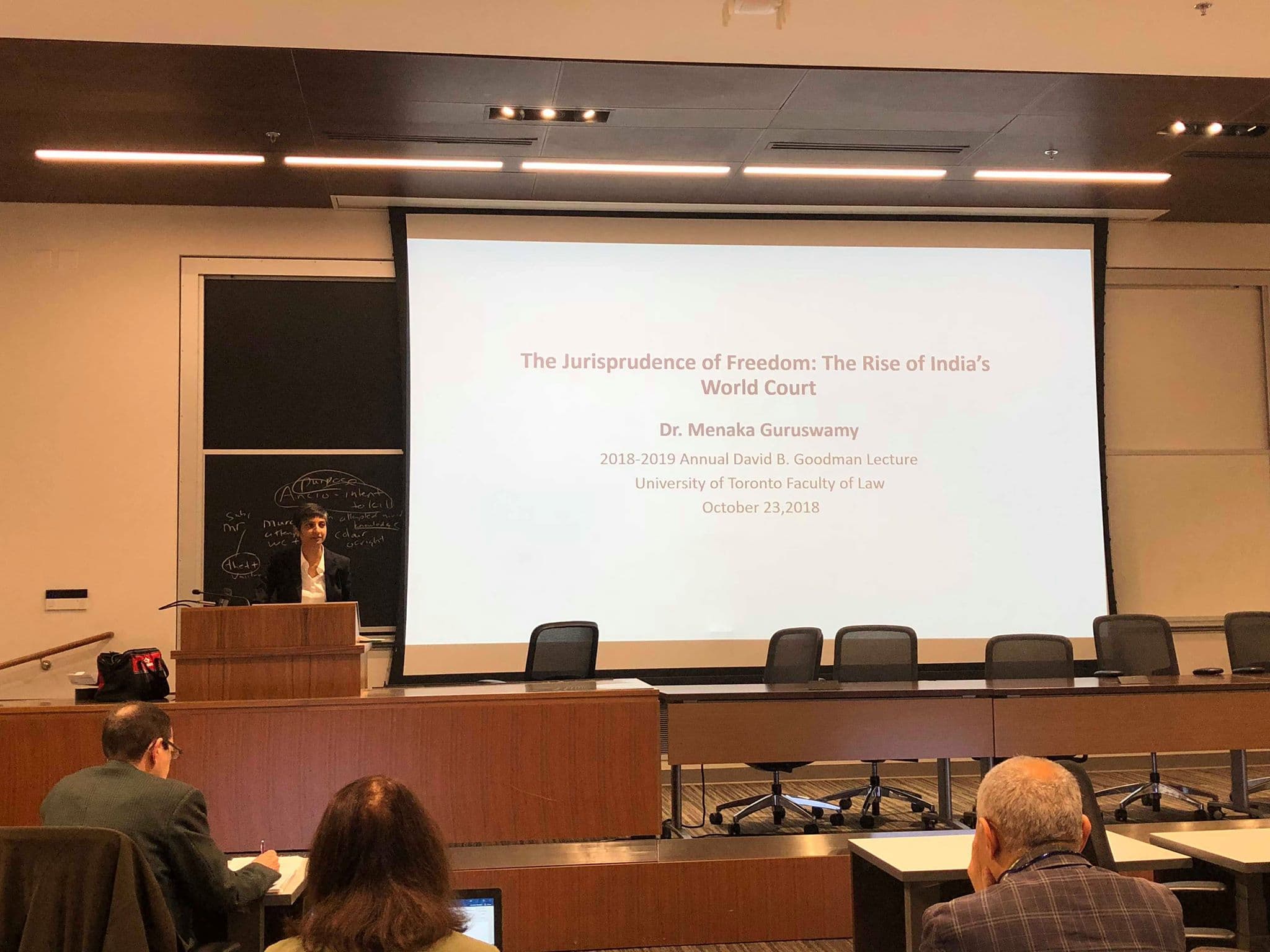Dr Menaka Guruswamy discusses litigation to legalize gay sex at the Supreme Court of India

Photo credit: Robert Nanni (2L JD/MBA)
On October 23, 2018, the University of Toronto Faculty of Law hosted Dr Menaka Guruswamy to deliver the annual Goodman lecture. This lecture was founded in memory of David B. Goodman to allow a distinguished member of legal practice to speak at the law school. The founding of the Goodman lecture has served two purposes. First, Goodman fellows benefit faculty and students by sharing their experiences in the application of the law. Second, the lectures serve as a refresher for visiting fellows by returning them to an academic environment.
It is unsurprising that Dr Guruswamy brought great insight to our school, as she is hardly a stranger to academia. Dr Guruswamy is a renowned author and holds the position of BR Ambedkar Research Scholar and Lecturer at Columbia Law School. She is presently teaching the intensive course “Constitutional Design in Post Conflict Democracies” at our law school.
Outside of her scholastic achievements, Dr Guruswamy is a litigator whose practice involves large constitutional claims in India, with a focus on bureaucratic reform. Her lecture provided insight into her most recent case, the decriminalization of consensual gay sex in India.
On September 6, 2018, a unanimous panel of five judges on the Supreme Court of India struck down Section 377 of the Indian Penal Code. Introduced in 1860, this Victorian era law banned sex “against the order of nature”, which has primarily targeted LGBTQ2S+ individuals over the past 158 years.
Dr Guruswamy, acting as lead counsel in this case, said that the outcome “affirmed values of constitutional morality over social morality.” This is a distinction that Dr Guruswamy made repeatedly throughout her lecture, commenting on the divide between the word of law and the people’s beliefs.
“How would these expected builders of modern India—its scientists, its teachers, its researchers, its inventors—discover and invent when they themselves were fearful of being discovered for who they were and how they loved?”
Dr Guruswamy
Although the highest court in India proclaimed that LGBTQ2S+ Indians are deserving of the full range of fundamental rights that their Constitution secures, this does not guarantee change in society’s view of LGBTQ2S+ Indians or their practices. However, what this judgment does guarantee is a newly achieved freedom.
Rhetorically, Dr Guruswamy asked the audience how this newly achieved freedom might materialize; she asked how life might feel different as a result of the judgement.
“A new freedom,” she began, “is the confidence of being recognized as a citizen worthy of protection by a Supreme Court, a Constitution, and a country.”
While this is not the first time that s 377 has been ruled unconstitutional, it is the first time that the Supreme Court of India has recognized it as such.
In 2009, the High Court of Delhi in Naz Foundation v Govt of NCT of Delhi held that s 377 was unconstitutional. On appeal to the Supreme Court of India in 2013, the Court held in Koushal v Naz Foundation that this declaration was legally unsustainable and reinstated s 377. Following several petitions, the Supreme Court of India heard Johar v Union of India, led by Dr Guruswamy, and officially decriminalized consensual gay sex.
The difference in this case, in Dr Guruswamy’s opinion, were the petitioners. The petitioners were five students attending the Indian Institute of Technology (IIT), a prestigious higher education institution in India. Dr Guruswamy explained that over 1 million Indians apply every year for approximately 2000 spots. She emphasized how much these students had to lose by coming forward for this case—in effect outing themselves as felons for the sake of justice—and used their student status as a litigation strategy.
“How would these expected builders of modern India—its scientists, its teachers, its researchers, its inventors—discover and invent when they themselves were fearful of being discovered for who they were and how they loved?”
Dr Guruswamy allowed these brave students to be the protagonists in her story of a law that offends the Indian Constitution’s section 15 non-discrimination clause. But this was hardly an easy story to tell.
The political climate in India is one that polices differences. Anything that deviates from the norm—be it clothing, faith, or eating habits—is seen as dissent that must be corrected by law. Consequently, the Supreme Court of India’s declaration that the policing of this particular dissent is unconstitutional is even more meaningful.
Although the divide between constitutional and majoritarian morality in India may continue to exist beyond this judgment, it is certainly a step toward a more inclusive and respectful society.
Dr Guruswamy hopes that, moving forward, this judgment will have resonance and inspire introspection in commonwealth countries whose laws are founded upon Victorian era morality, such as Sri Lanka, Trinidad, Belize, Pakistan, and Malaysia.





